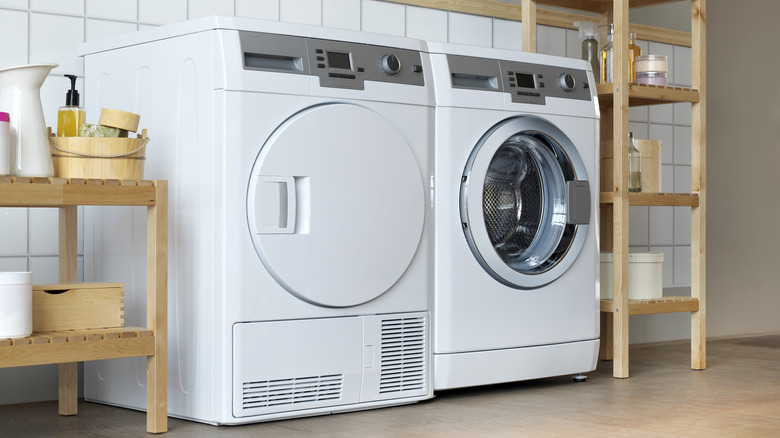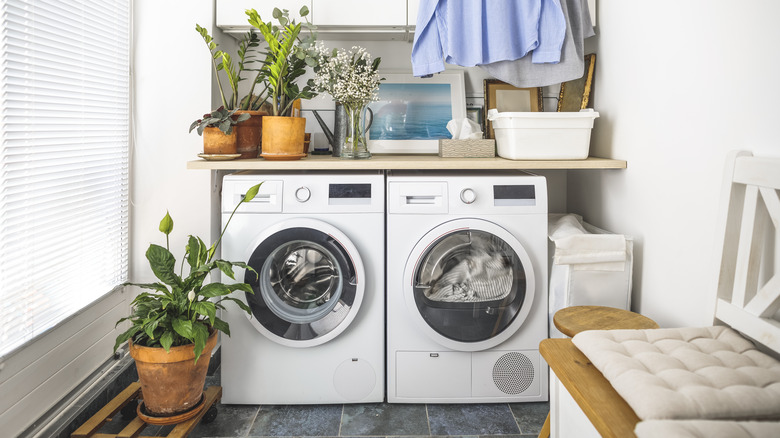How To Tell If You Have A Gas Or Electric Dryer In Your Laundry Room
Does this sound familiar? Your dryer breaks, you head to your nearest home appliance store, and they ask if you have a gas or electric dryer in your laundry room. The same holds true if you need your dryer cleaned — you need to know if it's gas or electric. If you don't know, there is a quick way to determine the difference. The easiest thing to do is to look at your dryer's plugs and the outlets they connect to. For example, gas dryers have three-prong plugs and electric dryers have four-prong plugs. But this isn't the only difference you need to look out for.
Gas dryers connect to regular outlets but also connect to a gas line. Electric dryers, on the other hand, have large cumbersome cords. If you're still unsure, you can research your dryer's model number, seeing what comes up in your search. If the Internet proves fruitless, you could always call an appliance store or even your dryer's manufacturer to see if they can assist you with determining if it's gas or electric. However, the information in this article should help you understand more about the type of dryer you have, especially if you're trying to figure out if a gas or electric dryer is the best fit for your laundry room.
Electric dryers require four-prong plugs, 240-volt utility outlets
To determine if you have an electric or gas dryer, you may need to unplug its cord. If you have an electric dryer, you'll see a four-prong plug; it's that simple. But there are other things you can keep in mind; for example, if your house is all-electric or has oil heat, you most likely have an electric dryer. The caveat would be if you have a propane tank specifically for appliances such as this. This would allow you to use a gas dryer.
Electric dryers require 240-volt utility outlets. These outlets are bigger than standard ones and have four openings on them, and the bottom opening is shaped like an "L." If you see this type of outlet in your laundry room, then there is a good chance you have an electric dryer.
If you decide to purchase an electric dryer, there are several benefits. For starters, they're usually cheaper to buy. Unfortunately, they may cost you more down the road, but if your home doesn't have a natural gas hookup, this may be the only type of dryer you can invest in. If you want to save money with your electric dryer, you can always air-dry your laundry (as you can do with these tips) from time to time.
Gas dryers don't need 240-volt outlets but require gas lines
If your dryer has a plug with three prongs, it's a gas dryer. Unlike electric dryers, you don't need a 240-volt utility outlet. You just need a 120-volt standard electrical outlet, so pay close attention to what it's plugged into. However, you also need a gas line for these dryers. Check to see if something that's been painted yellow or is made from stainless steel is connected to the back of your dryer. Just don't disconnect the gas line yourself — you should only consider trusted professionals to avoid a potential gas leak.
In addition, you should also install a carbon monoxide detector near your gas furnace (if this is your home's heating source) and in your laundry room near your gas clothes dryer. Regardless of the type of dryer you have, you should also install smoke detectors near them.
Since natural gas is usually less expensive than electricity, you can save money when using gas dryers, especially if you purchase one of the best dryers under $700. But the type of dryer you purchase may depend on what's already in your laundry room, so familiarize yourself with your home's appliances. This lets you make informed decisions regarding maintenance and product replacement.


